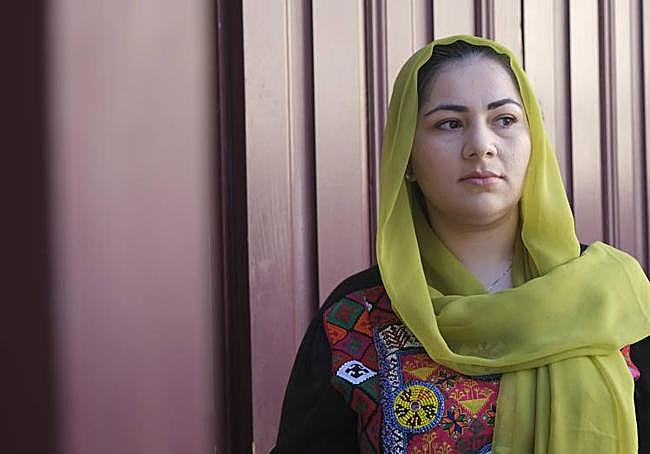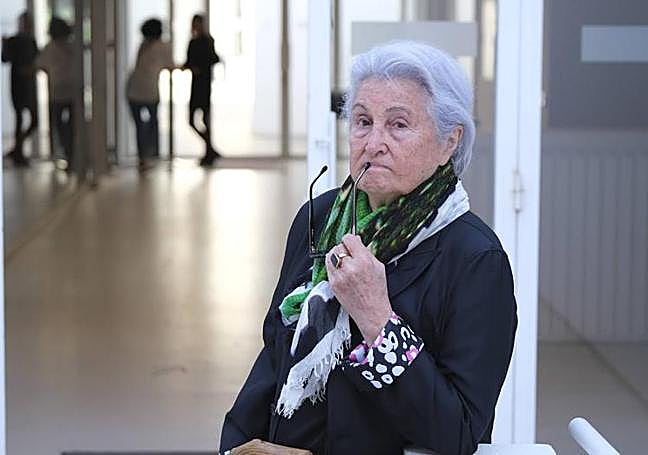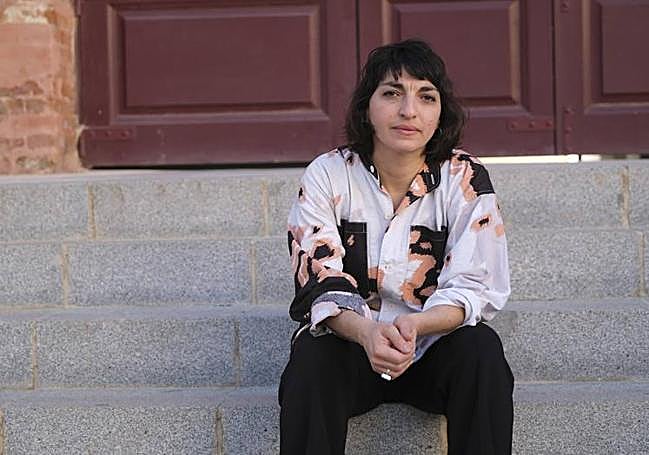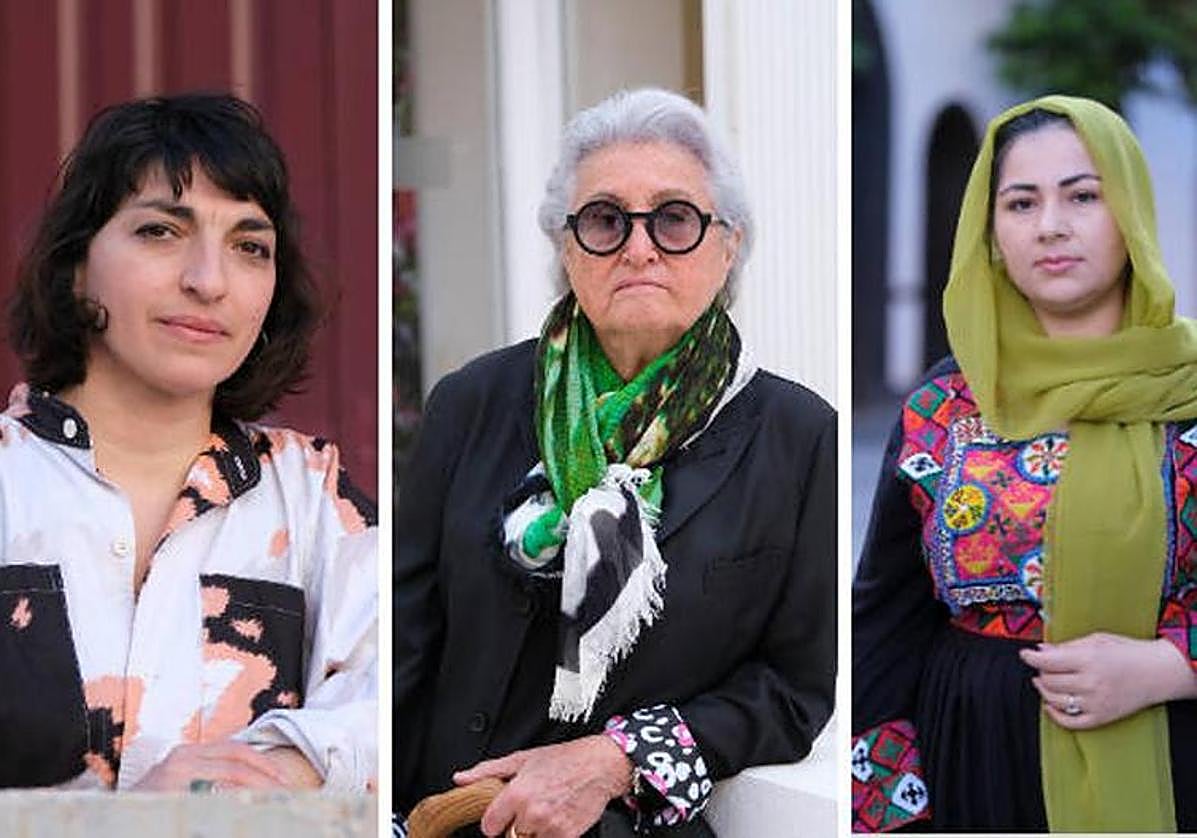Women challenged by history
Geopolitics and gender. ·
An Afghan journalist who fled the Taliban’s arrival in Kabul, an Iranian filmmaker with high hopes for the protest movement and an Algerian analyst of feminism and the Arab Spring meet in MalagaCristina Vallejo
Viernes, 21 de abril 2023, 15:43
Wassyla Tamzali, an Algerian legal expert and writer, says it straight: in feminism, different perspectives co-exist. Several feminists go together recently in Malaga to analyse how the latest events in North Africa and the Middle East have affected the lives of women. To take one example: the Arab Spring that happened more than a decade ago. This societal agitation brought changes, advances for the women leading the way in such protests, but the rights they won are once again under threat.
Now dissent against the Iranian regime is taking shape. The fuse that ignited the latest fire demanding justice was the murder of a woman for not correctly wearing her veil, as viewed by the morality police. But filmmaker Bani Khoshnoudi, based in the United States, says that the protests were made by men and women across the globe against a regime whose core purpose is the oppression of women, and from which they no longer seek far-reaching reforms, rather its total collapse.
Afghanistan has been the latest example of how women’s lives can change overnight with a change of regime. The return of the Taliban to Kabul in August 2021, and the departure of the United States troops, caused Afghan women to lose their right to work and girls to stop attending school. Khadija Amin had to leave her country; she worked there as a journalist, she did not back down and wanted to bear witness to these events, denouncing the situation to international media. That made her the victim of death threats and is why she ended up in Spain as a refugee.
Nor could Khoshnoudi ever return to Iran. Rather, as she points out, she could enter the country, but once inside, the authorities would never let her leave owing to the censorship suffered by one of her video productions, in which she narrated the history of previous uprisings.
Khadija Amin Afghan journalist
‘Our men fear the Taliban, but they put up with them’
Khadija Amin is a journalist who used to work for Afghan state television presenting the news. When the Taliban arrived in Kabul on 15 August, 2021, her life changed: women could no longer work. Amin denounced the situation to the international media. “It’s important to me to talk about it. We are journalists and we want to publish the reality in our country,” she stated in her defence. Then she started receiving threats. A Spanish journalist helped her get out of Afghanistan and she now lives in Spain where she helps other women from her country and tries to revive her career. She left behind her husband, from whom she is divorced, and her three children: “I tried to bring my children over with their father. We prepared all the papers, but he told me that he didn’t want to come to Spain just to hurt me.”

Zoom

–Has the international community abandoned Afghan women?
–Yes. Since the war in Ukraine, the situation has changed. Now I work as a volunteer helping Afghan women who fled to Pakistan. They are awaiting visas to enter other countries. But it is very slow. They can’t return to Afghanistan and in Pakistan they have no food.
–How have the expectations of Afghan girls changed?
–It’s been a year since girls were stopped from going to school. Neither are our young women permitted to go to university. They are just cooped up at home.
–Reasons? Religion, machismo, the struggle for power?
–We have no problems with our religion. The thing is the Taliban want to have power over women. They know that when a woman has an education, she has more freedom to choose the life she wants. Now, we are also concerned that they want to marry girls as young as 12 years. I was married at 19 years old. My marriage was also arranged by force.
–A paradox: a war could bring hope for these women...
–For twenty years we were fighting to gain our rights. Now, once again, women fight for freedom. And the men do not support us: they are afraid of the Taliban but they also tolerate them and agree with them that women should stay at home. When I married ten years ago, there was democracy in Afghanistan, but my husband wouldn’t let me study or work. After 15 August the women came out to protest. The Taliban arrested many of them and there are some whose whereabouts remain unknown.
–The rights of Afghan women are hostage to the geopolitics of the country.
–With each regime change, women suffer. My mother was a teacher and when the Taliban first took power she had to stay at home. I studied with my sister in clandestine classes, but my brother could go to school. The level of violence in Afghanistan is very high right now. No one is listening to Afghanistan’s women. We had a ministry for women’s affairs, but the Taliban closed it down. Now there are no female judges, there is no one to help the women.
“When I married ten years ago, there was democracy in Afghanistan, but my husband wouldn’t let me study or work”
Khadija Amin
Afghan journalist
–What about the veil?
–In photos I always wear one. It’s a symbol for women in Afghanistan to know that I might be outside my country, but I’m still fighting for them.
–Will you go back to Afghanistan?
–If one day there is freedom in Afghanistan and women have rights, yes, I would like to return and work in my country. But not now.
Wassyla Tamzali Algerian legal expert and writer
‘It’s not a catch-all. Within the plurality of feminism there are rules’
Wassyla Tamzali has journeyed far and wide in her commitment to women’s rights and her fight for women’s freedoms on platforms such as that of Unesco. She downplays contemporary feminist debates by stating that there have always been different ebbs and flows in the movement. But she also asserts that it should not be a free-for-all in feminism: there are rules that all ideals must agree on. She also verifies that, as can happen when a great love affair ends, one cannot speak of failure, as happened with the Arab uprisings.

Zoom

–What’s your take on what feminism is going through right now? On the one hand, it has experienced a resurgence, but on the other, cracks have appeared.
–In feminism there have always been different trends; that’s to be expected because it has a long, deep history. Firstly, for example, there were the notions about equality with men, then differentiating ourselves from men, and the debate centred around these two ideas. And now the debate is different: it focuses on the issue of universality and the question of decolonisation [adopting a less Euro-centric view of feminism to date]. It is a debate that does not put feminism at risk, but rather talks about the liberation of women from different points of view. We’re not all just one case; this feminism accepts at its heart that women of Africa have their points of view, Arab women theirs, and Westerners too. There’s no division. They are different viewpoints. But not everything is feminist. It’s not a catch-all. It is not about claiming that we are feminists and suddenly we are feminists. Within the plurality of feminism there are rules on which all feminist debates have to agree.
For example, Islamic feminism is not feminism. Why? Because this notion defends Islam for affording certain rights. And that is true. But there are many which are not the case: being in favour of polygamy or making inheritance laws that benefit men.
That is a defence of Islam under the guise of feminism. Islam, although it guarantees some rights, prevents women from entering other fields, other roles. And this is clearly not feminist. Islamic feminism is manipulated by men, clerics, to create a conflict with secular feminism - which truly is feminism because it fights for all the rights of women. They accuse secular feminists of importing analogies and ideas that clash with their own culture. This is how a confrontation between two peoples is created so that each claims to be fighting for its own identity.
-What would be the rules that feminism must comply with?
-We have done very important work on the awareness of freedom. Our grandmothers, great-grandmothers and great-great-grandmothers only realised at the end of their lives that they had had no freedom because they’d assumed that they had to marry certain men, that they had to meet the expectations of their family or that they had to conform to the stereotypes set by the patriarchy, for the good for the family.
Women today live in perpetual turmoil, an inner battle over what to do: work or take care of the family. Those conflicting feelings are the fruits of gaining the freedom to choose, proof that we achieve such freedom. If we were in a world where we had no choice but our traditional role, that conflict would not occur.
The freedom of women is based on a principle: the equality of men and women. From there we have the right to determine what to do with our life, our body, sexual orientation and to develop our profession. But this comes with a heavy load because we acknowledge that we cannot be everywhere.
“I’m an abolitionist because I think it is the most despicable form of patriarchal domination”
Wassyla Tamzali
Algerian legal expert and writer
–You have spoken of a paradigm shift in feminism.
–#MeToo was revolutionary. A paradigm shift. The problem is now moving into the legal field. The lawyer for film producer Harvey Weinstein told him not to plead guilty because his relationships had been with adult women who had freely entered his office. What’s going on? That this is a patriarchal interpretation of the law and definition of consent, but now we can better understand it under a feminist microscope: they went voluntarily, in quotes, to his office; nobody tied their hands or feet; but the power rested with the producer as viewed by those women. Consent is now interpreted from a feminist perspective and this was a turning point.
–Have you taken stock of what was yielded by the Arab uprisings, the Arab Spring?
–No revolution is going to be a total failure. But unfortunately, in history, Gramsci [Marxist thinker] already said it; a revolutionary movement is always followed by a counter-revolution. In Tunisia, for example, they are now in crisis, although their revolution was one of the more robust examples. And in Algeria, as power was never fully taken from those in power, those ruling classes now take revenge out of fear, leading a conservative movement, fast-freezing any moves for change. Women are always the first to pay the price for any counter-revolution.
–Should feminism be in favour of abolishing prostitution?
- I am an abolitionist. Since the feminist movement is not a police state that dictates what is and is not included in feminism, there are feminists who are in favour of prostitution. I am against it because I think it is the most despicable form of patriarchal domination.
Bani Khoshnoudi Iranian filmmaker and artist
‘If women don’t free themselves, nobody will have freedom’
She was born in Tehran but, with the Islamic revolution led by Ayatollah Khomeini, she fled with her family to grow up outside Iran. She then returned to work as a filmmaker and artist for several years. But now Bani Khoshnoudi lives in the United States and fears that if she returns to Iran, they will not let her leave. The cause? Her film, The Silent Majority Speaks, about the uprisings of 2009, which was banned in the country.

Zoom

–How does it feel to be living through these times as Iran’s women revive their fight?
–It’s a very exciting moment. It is the result of years of struggle, years of resistance. It is not something that has just emerged, but it has been ‘reinterpreted’ by the younger generations who have no memory of what we did in the previous protests, but who know about the here and now and who do not tolerate any kind of imposition. Many struggles are converging. It seems that the fruit has already matured so that we can pick it. It is an unprecedented struggle at all levels of society.
–Will women be the key players in the regime’s overthrow?
–The repression of women is the backbone of the regime. Now a rejection of that repression has been flagged up by the murder of a woman and by the universal message of ‘woman, life and freedom’. All of this is led by women. But not only them. Also all society is aware that a key aim of the regime is the oppression of women. If society doesn’t come together to liberate women, there will be no freedom for anyone.
“After decades, people expect nothing from this government. But... when or how will it fall? We don’t know”
Bani Khoshnoudi
Iranian filmmaker and artist
–So, there is solidarity from men?
–Most people have been against the regime from the beginning, because the regime has never existed with peace. From the very first day they were executing people. There are so many men who are against the oppression of women. Now the cracks are showing in the culture of patriarchal authority. I would say that this is not just about men showing their solidarity, but that it is an uprising, a revolution, that men and women are doing together.
–The regime has responded with violence, but it has announced an end to the morality police.
–It was something that all the foreign media reported. Untrue. There is so much resistance in the street with women going uncovered that it is already overwhelming: they can’t kill or arrest all of them. It has always been like this: such violence from the morality police has been on and off from the beginning for the last 45 years. The regime is never going to change and that is what people have realised after decades. The people expect nothing from this government. But... when or how will it fall? We don’t know that.
–Is there an alternative?
–There are many groups. What happens is that we will not see a single party, group or figurehead taking power; instead we’ll see advisory bodies coming forward. This is not a utopian idea. These groups already exist: intellectuals, lawyers, other associations, sometimes illegal. Many are imprisoned. There are also people outside the country. But there is coordination between those outside and those inside. It is also something that will take time.
–Do you need international help?
–What is being formally requested is that the European and US governments do not sit down with the Iranian government, because that legitimises and normalises it. We’re also asking that at least the international community listens to, and supports, the opposition, but that is very naïve of us.
